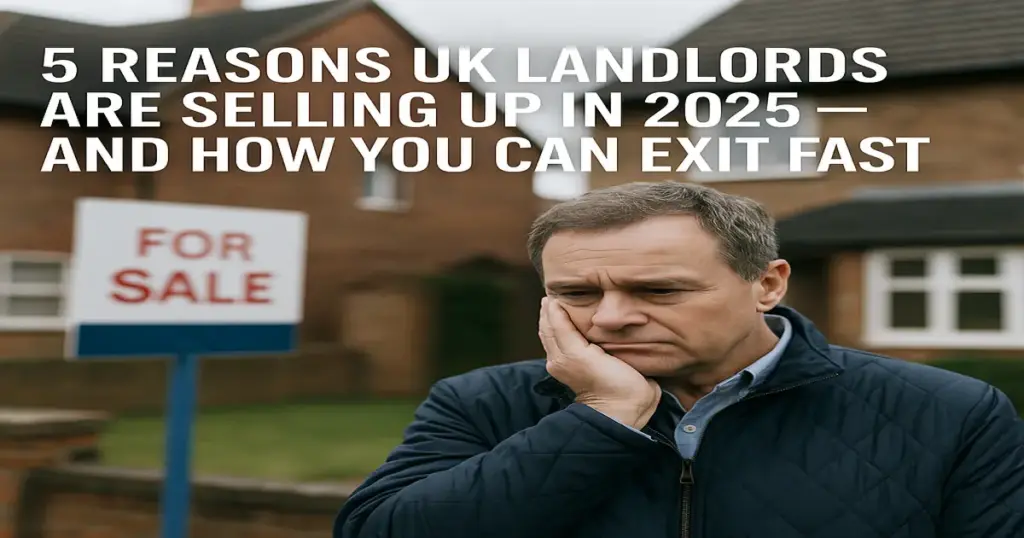5 Reasons UK Landlords Are Selling Up in 2025 — And How You Can Exit Fast
The UK property market is undergoing a seismic shift in 2025, and landlords feel the squeeze. Once seen as a dependable path to long-term wealth, buy-to-let is no longer the golden goose it once was.
Across the country, thousands of landlords are selling up, questioning whether the hassle, risk, and rising rent are worth it anymore.
If you’re facing this, you’re not alone—and you’re not wrong to consider your exit strategy. In this article, we break down the top 5 reasons landlords in the UK are selling their properties in 2025, along with practical tips on how to exit the market quickly, efficiently, and with minimal stress.
Reason 1: Rising Interest Rates Are Slashing Profit Margins
Low interest rates made buy-to-let a relatively low-risk, high-reward strategy for decades. But the economic landscape has changed dramatically. To control inflation, the Bank of England has kept interest rates elevated through 2024 and into 2025. This has been devastating for landlords with variable-rate mortgages or those looking to remortgage.
Monthly repayments have soared, eating into—or completely eliminating—rental profits. In many cases, landlords are now operating at a loss. With no sign of rates returning to pre-2022 levels soon, many landlords are deciding it’s time to cut their losses.
Key takeaway: If your profit margins have vanished, selling now may be more financially sensible than waiting for an uncertain future.
Reason 2: Increasing Regulation and Compliance Burdens
The regulatory burden on landlords in the UK has intensified significantly. From changes in energy efficiency standards to increased tenant protections, the financial and administrative cost of staying compliant has become overwhelming.
Here are just a few of the regulations affecting landlords in 2025:
EPC Requirements: Properties must meet stricter energy performance standards (EPC rating C or above in most cases).
Section 21 Ban: The Renters Reform Bill eliminates fault evictions, making it harder to regain possession of your property.
Licensing Schemes: Many councils have expanded selective and additional licensing schemes, requiring more paperwork and fees.
Health & Safety: Landlords must undertake frequent, detailed inspections to meet new safety regulations.
These rules are well-intentioned to improve housing standards and protect tenants, but many small landlords feel buried under red tape. The result? A growing number of people are throwing in the towel.
Key takeaway: If the regulatory climate feels unsustainable, exiting the market may bring long-overdue peace of mind.
Reason 3: Falling Rental Yields in Overheated Areas
While rental demand remains high in the UK, that doesn’t always translate to high returns. Property prices have risen faster than rents in some areas, especially London and the South East, leading to poor rental yields.
Even with high monthly rent, landlords may find that the return on their capital investment is no longer attractive compared to other options like stocks, savings, or pension funds.
Additionally, rent controls — now being discussed more seriously by local authorities in response to the housing crisis — threaten to cap income and reduce flexibility.
Key takeaway: If your property’s yield is underwhelming or you fear future rent caps, this could be your cue to exit.
Reason 4: Tenant Issues and Property Damage
Even with the best screening, problem tenants remain a reality of property management. The emotional and financial toll can be immense, from late payments and anti-social behaviour to legal disputes and costly repairs.
And now, with Section 21 evictions on the way out, removing tenants has become more complicated and time-consuming. For many landlords, especially those managing properties, tenant issues are the final straw.
Key takeaway: If managing tenants is causing stress, burnout, or financial strain, selling could be a relief and a release.
Reason 5: Better Opportunities Elsewhere
Many landlords realise that the time, capital, and stress invested in property might be better invested elsewhere. With the rise of more flexible, passive investment opportunities—from ISAs and pensions to ETFs and crowdfunding platforms—bricks and mortar are starting to lose their shine.
Add to that the tax burden on landlords (stamp duty, capital gains tax, reduced stamp duty relief), and it’s easy to see why many are cashing in and reallocating their funds.
Key takeaway: Selling up now allows you to unlock equity and pursue other investment avenues that require less work and offer more liquidity.
How to Exit the Property You’ve Quickly and Smoothly
Once you’ve decided to sell, the next step is that speed matters. Here’s how you can make a fast, clean exit from your buy-to-let property in 2025.
Decide: Tenanted or Vacant Possession?
If you want the highest price, selling with vacant possession (i.e., after the tenant has moved out) is often easier. Most homebuyers prefer a property they can move into, and many buy-to-let investors prefer a blank slate.
However, this route requires giving notice to tenants, which could take several months, especially under new legislation.
Alternatively, you can sell with tenants in situ, which may appeal to other landlords looking for ready-made rental income. But this narrows your market and may result in a lower price.
Tip: Talk to an experienced property agent to understand the pros and cons of your situation today, including a realistic valuation.
In today’s market, overpricing your property is a costly mistake. Buyers are more cautious, and mortgage affordability is stretched.
To price your property correctly:
Get valuations from at least three estate agents
Compare recent sales of similar properties in your area
Factor in the condition of your property, especially regarding the EPC rating and compliance
Tip: Be honest about needed repairs. Hidden problems discovered during a survey can derail your sale.
Consider a Cash Buyer or Property Buying Company
If you want to sell quickly, a cash buyer or professional home-buying firm could be your best bet. These companies can complete the process in as little as 7–28 days and typically buy properties in any condition.
However, speed comes at a cost: they often offer below market value (you’re typically 85–90%).
Still, this route can be a lifesaver if you’re under time pressure, due to financial stress, repossession risk, or simply wanting to move on.
Tip: Always check reviews and accreditations before working with any quick-sale company.
Prepare Your Property for Sale
Whether you’re selling to a homeowner or investor, first impressions count. A well-presented property sells faster and for more.
Declutter and clean thoroughly
Fix some maintenance issues (leaky taps, broken tiles)
Freshen up tired paintwork
Ensure you read all the required documents (gas certificate, tenancy agreements, etc.)
Tip: Even basic staging — such as new bedding, lamps, or curtains — can boost appeal.
Work With the Right Estate Agent or Solicitor
Not all agents are created equal. Choose one with experience selling buy-to-let properties and knowledge of current landlord regulations.
You may also want a solicitor who understands the legalities of selling with tenants and can navigate the process efficiently.
Ask for:
Average time to sell
Typical sale price vs. asking price
Experience with tenanted property sales
Tip: Look for agents offering no-sale-no-fee agreements and clear communication.
Frequently Asked Questions (FAQs)
Should I wait until interest rates drop to sell my property?
That depends on your financial situation. While lower interest rates may not be affordable for buyers soon, they are not guaranteed. If you’re losing money now or want to exit quickly, waiting could cost more than you gain.
Can I sell my buy-to-let property if my tenants are still living there?
Yes. You can sell with tenants in situ, but your buyer pool will be limited to other landlords. You must provide tenancy agreements, deposit protection evidence, and proof of rent payments.
What happens to my mortgage if I sell the property?
Your mortgage is paid off from the sale proceeds. Your solicitor will handle this. Be aware of any early repayment charges (ERCs) that may apply — these are typically more common on fixed-term products.
Will I have to pay Capital Gains Tax (CGT)?
If your property has risen in value since you bought it, you may owe CGT. The rate for residential property is 18% (basic rate taxpayers) or 24% (higher/additional rate taxpayers) in 2025. You’ll have a tax-free allowance (currently £3,000) and can deduct certain costs like solicitor and estate agent fees.
How long does it usually take to sell a buy-to-let property in 2025?
With vacant possession, it could take 8–16 weeks on average, depending on market conditions and conveyancing delays. Selling with tenants may take longer unless you sell to a specialist investor or cash buyer.
What if I have negative equity?
If yoproperty’se is higyou’llan your property’s value, you’ll need to cover the shortfall yourself — or negotiate with your lender. This is more common in areas where prices have dropped since the 2020s boom.
Can I sell to my tenants directly?
Yes—and it can save you time and estate agent fees. Your tenants may be interested in buying your property, especially if they’ve lived there long-term. Consider offering them a discount for a smooth, direct sale.
Final Thoughts
Selling your buy-to-let property in 2025 might feel like the end of an era, but it can also be the beginning of a more flexible, less stressful financial life.
Whether you’re disillusioned by red tape, tired of tenant issues, or set to rebalance investments, you’re not alone in making this move.
The key is to approach your exit strategically. Know your reasons, understand your options, and take action. The sooner you act, the more control you’ll have and the faster you can move on to whatever comes next.
Useful Links
Gov.uk – Private Renting: Evicting Tenants
https://www.gov.uk/evicting-tenants
The official government page explains the process for serving Section 21 and Section 8 notices, plus court procedures.Shelter England – Tenancy Rights and Eviction
https://england.shelter.org.uk/housing_advice/eviction
Useful to understand the rights of tenants and the legal limits of landlord actions.Citizens Advice – Eviction and Rent Arrears
https://www.citizensadvice.org.uk/housing/renting-a-home/eviction
Provides balanced guidance on eviction rules and when landlords can legally act.
Read our top Blogs:
Sell My Property Fast For Cash In Wandsworth
What to Do If Your House Won’t Sell: Fast Solutions That Work
How to Sell a House Fast: Proven Tips to Get a Quick Sale Without Estate Agents






